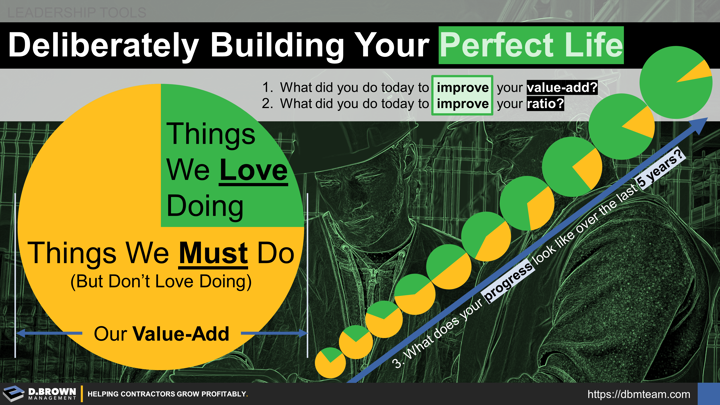Becoming truly wealthy in all aspects of life takes deliberate planning and execution.
The foundation of all sustainably growing contractors is a team with each person individually strong, sharing common values aligned around a common purpose.
- The responsibility for defining and building our own unique perfect life belongs to each of us individually.
- As leaders, we have the privilege and duty to help those that trust us define and build their perfect life, even if that means their path will diverge from ours at some point.
- As team members, we owe it to our teammates to help them define and build their perfect lives with our support, experience, wisdom, and resources.
Here are a few things to consider as we work to define and build our version of a perfect life.
#1 - Take inventory of our value-add, which is the sum of everything we do.
- What are all the dimensions we measure value-add on, personally and professionally?
- Is the value we create transactional or real?
- How do others evaluate our value-add?
- How consistent is our value-add if we look at the last month, quarter, year, and decade?
- How much has our value-add grown each year over the last 5 years? We must be very intellectually honest with ourselves. We must bring in objective data where relevant. We must ask our peers, friends, family, and leaders. We may not love all the answers we get.
- Remember that lasting and material changes in compensation nearly always lag responsibility and demonstrated value-add.
#2 - Take inventory of how we actually spend our time.
- Do a detailed time study for a week of everything done personally and professionally.
- Take a look back at your calendar over the past month, quarter, and year.
- Objectively, what percentage of time was spent doing the things you absolutely love doing? What percentage of time was spent doing things that were your "Highest & Best Use" in the moment?
- How does the percentage of time spent on things you truly love doing compare with last year? The year before?
- How does the percentage of time spent on things where you add the most value (Highest & Best Use) compare to last year? The year before?
#3 - It's a deliberate process of continuous improvement, not a task to be done once.
- Just like any other continuous improvement process in business, our lives are a PDCA (Plan>Do>Check>Adjust/Act) cycle.
- We must take time each day to deliberately reflect (Check) on how we are doing and determine what Adjustments need to be made. Then we need to Act on them. A great starting point are these Six Daily Questions from Marshall Goldsmith. A simple daily scoring sheet can add a lot of value.
- Just like business planning, you need to be deliberate in the time you spend quarterly and annually by deeply reflecting and planning bigger changes to your personal and professional life. The 7 Habits of Highly Effective People is a great starting point to help with that reflection process.
- Experienced coaches and mentors can be invaluable in helping facilitate this reflection process. Look inside and outside your company. Look toward your community leaders. Look into programs like Rapport Leadership or coaches like Mike Brunner. These will evolve over time, and remember that there is no perfect combination for all people.
“Most people overestimate what they can do in one year and underestimate what they can do in ten years.”
Be patient but be aggressive.
- Building your perfect life and business takes time.
- Bring others on the journey with you as you climb the mountain.

